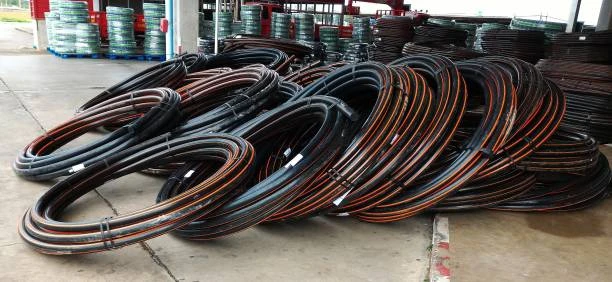Introduction
High-Density Polyethylene HDPE pipe are revolutionizing infrastructure across various sectors, including water supply, wastewater management, and gas distribution. As the demand for durable, cost-effective, and environmentally friendly piping solutions continues to rise, Canada-based Encoma has announced its strategic entry into the HDPE pipe market. This article explores Encoma’s motivations, the benefits of HDPE pipes, their applications, and the impact of this new market entrant on the industry.

Understanding HDPE Pipe
HDPE pipes are manufactured from high-density polyethylene, a thermoplastic polymer characterized by its high strength-to-density ratio. These pipes are used widely in various applications due to their robust properties, including resistance to corrosion, chemicals, and extreme temperatures.
Benefits of HDPE Pipe
- Durability: HDPE pipes are designed to last, with lifespans often exceeding 50 years under normal conditions.
- Lightweight and Flexible: Their lightweight nature makes transportation and installation easier compared to traditional materials, while their flexibility allows for adaptation to various installation methods.
- Corrosion and Chemical Resistance: HDPE pipes do not rust or corrode, making them ideal for transporting aggressive substances commonly found in wastewater and industrial applications.
- Cost-Effectiveness: While the upfront costs may be higher than alternatives, the long-term savings from reduced maintenance and replacement make HDPE pipes a cost-effective choice.
- Sustainability: HDPE is recyclable, contributing to a more sustainable approach in construction and infrastructure development.
Encoma’s Strategic Entry into the HDPE Pipe Market
Encoma’s decision to enter the HDPE pipe market is driven by several key factors:
Market Demand
The global demand for HDPE pipes has been steadily increasing, fueled by urbanization, infrastructure development, and the need for sustainable water management solutions. Encoma aims to meet this growing demand by providing high-quality HDPE pipes tailored to various applications.
Commitment to HDPE pipe Quality
Encoma is known for its commitment to quality and innovation. By leveraging advanced manufacturing techniques, the company plans to produce HDPE pipes that meet or exceed industry standards. This focus on quality positions Encoma to compete effectively in the market.
Strategic Partnerships
To establish a foothold in the HDPE pipe sector, Encoma has formed strategic partnerships with key stakeholders, including suppliers, distributors, and construction firms. These collaborations will enhance their distribution capabilities and improve market penetration.
Applications of HDPE Pipe
HDPE pipes are versatile and can be used in a variety of applications. Below are some key areas where Encoma plans to focus its efforts:
1. HDPE pipe Water Supply
HDPE pipes are widely used for potable water distribution due to their durability and resistance to corrosion. Encoma aims to provide reliable solutions for municipalities looking to upgrade their aging water infrastructure.
2. HDPE pipe Wastewater Management
In wastewater treatment facilities, HDPE pipes facilitate the transport of sewage and effluent. Encoma’s entry into this market aims to address the increasing demand for reliable wastewater management solutions.
3. HDPE pipe Industrial Applications
Many industries rely on HDPE pipes for transporting chemicals, gases, and other substances. Encoma’s expertise in manufacturing will enable it to cater to the specific needs of various industrial sectors.
4. HDPE pipe Agricultural Use
HDPE pipes are also used in agricultural applications for irrigation systems. By providing high-quality piping solutions, Encoma can contribute to improved water management in farming.
5. Mining and Resource Extraction
The mining industry often requires robust piping solutions for water transport and tailings management. Encoma’s entry into this sector could fill a crucial gap in the market.
Impact on the HDPE Pipe Industry
Encoma’s entry into the HDPE pipe market could have several implications for the industry:
Increased Competition
As a new player in the HDPE pipe sector, Encoma will introduce increased competition, which can lead to innovations in product development and better pricing strategies for consumers.
Focus on Sustainability
With an emphasis on sustainable practices, Encoma may drive other companies in the industry to adopt greener methods of production and distribution. This shift toward sustainability is crucial as environmental concerns continue to grow.
Technology Advancements
Encoma plans to utilize advanced manufacturing technologies, which could set new standards for quality and efficiency in the HDPE pipe market. This technological push may compel other manufacturers to enhance their processes to remain competitive.
Challenges Ahead
While Encoma’s entry into the HDPE pipes market presents numerous opportunities, several challenges may arise:
Established Competitors
The HDPE pipes market already has several well-established players with strong brand recognition. Encoma will need to effectively differentiate itself to gain market share.
Regulatory Compliance
Navigating the regulatory landscape can be complex, especially in sectors like water supply and wastewater management. Encoma must ensure that its products comply with all relevant regulations and standards.
Market Fluctuations
The construction and infrastructure sectors can be volatile, influenced by economic conditions and government policies. Encoma will need to remain agile to adapt to these changes.
Conclusion
Encoma’s entry into the HDPE pipes market marks a significant development for the industry, with the potential to drive innovation, sustainability, and competition. By focusing on quality, strategic partnerships, and various applications, Encoma aims to carve out a niche for itself in this growing market. As the demand for reliable and efficient piping solutions continues to increase, the impact of Encoma’s presence will be closely watche by industry stakeholders.
FAQs
1. What are the primary applications of HDPE pipes?
HDPE pipes are use in water supply, wastewater management, industrial applications, agriculture, and mining.
2. How long do HDPE pipes typically last?
HDPE pipes can last over 50 years with proper installation and maintenance.
3. Are HDPE pipes recyclable?
Yes, HDPE is a recyclable material, making it an environmentally friendly choice.
4. What makes HDPE pipes a cost-effective solution?
While the initial costs may be higher, HDPE pipes require less maintenance and have a longer lifespan, leading to overall savings.
5. How does Encoma ensure the quality of its HDPE pipes?
Encoma uses advanced manufacturing techniques and adheres to industry standards to ensure the quality and reliability of its HDPE pipes.


















